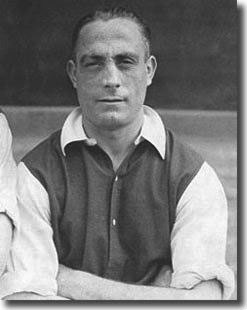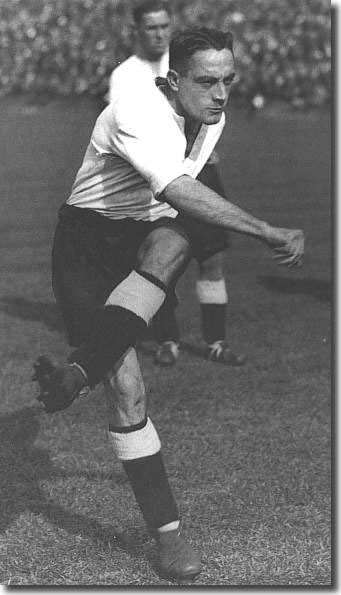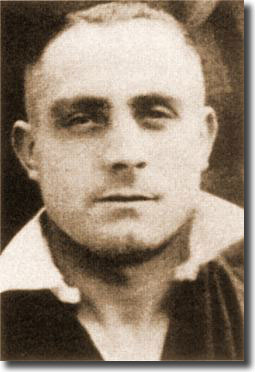 Wilf
Copping was the original hard man of English football, paving the way
for the likes of Norman Hunter, Ron Harris, Peter Storey, Tommy Smith
and Graeme Souness in later decades. However, it is highly debatable
whether any of them looked and played the part as well as Copping, with
his boxer's nose and build, his unshaven appearance on match days and
the bone shaking charges and tackles which were his trademark.
Wilf
Copping was the original hard man of English football, paving the way
for the likes of Norman Hunter, Ron Harris, Peter Storey, Tommy Smith
and Graeme Souness in later decades. However, it is highly debatable
whether any of them looked and played the part as well as Copping, with
his boxer's nose and build, his unshaven appearance on match days and
the bone shaking charges and tackles which were his trademark.
Copping, at left half, was liable to unnerve the opposition with just
one fixed stare from his craggy face. The harder the going, the more
Copping liked it. Had football been war, he would have been first out
of the trenches, bayonet fixed.
Yet Copping (his motto was 'Get stuck in') was more than just a bruiser.
When he won the ball, he could deliver precise constructive passes that
turned defence into attack. For all his infamy, he was always scrupulously
fair, earned respect for his excellent use of the ball when in possession
and had a useful long throw in his repertoire.
He was born in Middlecliffe, Barnsley, on 17 August 1909, and attended
Houghton Council School. He went for trials as a youth at Barnsley, then
a moderate Second Division side, but couldn't earn a place, so he went
to work as a miner, playing on a part time basis for Dearne Valley Old
Boys. He eventually attracted the attention of First Division Leeds United
and they signed him from Middlecliffe Rovers in March 1929 as a 19-year-old.
Copping had to wait more than a year to make his breakthrough into the
Leeds side as they had a marvellous 1929/30
and achieved a notable fifth place finish. A damaged knee put left-half
George Reed, a mainstay for three-and-a-half years, out of the side before
the season had started. Manager Dick Ray
called Copping into the side to replace him.
He made an inauspicious start that gave little hint of the fearsome,
indomitable defender that he was to become. The new half-back line of
Willis Edwards, Ernie Hart and Copping
that played in the first match of 1930/31,
a 2-2 home draw with Portsmouth, were all to play for England and became
one of the most celebrated half-back combinations of the Thirties. 'Copping,
whilst displaying latent talent, has something to learn,' observed the
Yorkshire Post, reflecting on the left-half's debut. He may have
had a quiet start but he didn't miss a game that season and became absolutely
outstanding, despite playing in a side that ended 21st and were relegated.
He missed just two matches in the next season, 1931/32,
as Leeds bounced straight back as runners-up to Wolves, then followed
up with 39 games in the First Division as they secured a creditable 8th
place finish. Copping was rewarded for three seasons of high consistency
and quality when he won his first England cap in May 1933 in a 1-1 draw
with Italy. His Elland Road teammate Billy Furness was also making his
debut, but, unlike Copping, that was his sole international.
Copping kept his place for the next match, a 4-0 defeat of Switzerland
at the end of May, and played in the first four England matches of 1933/34,
all of which ended in impressive victories. In the last one, a 3-0 victory
over Scotland in April 1934, he partnered another Elland Road half-back,
Ernie Hart, who was recalled after a year out of the  England
side.
England
side.
His form continued to be of the highest calibre throughout 1933/34
when Leeds finished 9th and he was an England regular, as he was resolutely
pursued by the legendary Arsenal manager, Herbert
Chapman.
Champions Arsenal were on the way to a second league title in succession
but needed to replace Bob John, now in his mid-30's. Chapman had targeted
24 year old Copping as the man for the job. 'That's the man for me,' he
is said to have remarked. The managerial supremo had already started negotiations
with hard up Leeds before his untimely death on 6th January 1934. It was
his replacement George Alison who eventually completed the deal in June
1934, paying out a sizeable £8,000 to secure one of the most valued talents
in English football.
Copping was badly missed. In 1934/35
Leeds sank to 18th place, they were all over the place at the back, having
no answer without their Iron Man to steady the ship.
Copping went straight into the Gunners side for the opening day of the
season on 24 August, making his debut as with Leeds in a drawn game with
Portsmouth, this time 3-3 at Fratton Park.
Given his no nonsense style, it was no surprise that Copping was a regular
visitor to trainer Tom Whittaker's treatment room during that season,
but he had only missed two games up until March, when he suffered a serious
knee injury at Goodison Park against Everton.
Arsenal were on the way to a third successive title, but desperately
needed to get at least a point from the game. The Arsenal keeper, Frank
Moss, had injured his shoulder and, with no substitutes allowed, had switched
to the left wing with full-back Eddie Hapgood replacing him in the net.
Copping then picked up his injury, but for the good of the team soldiered
on with a tightly bandaged knee. Amazingly the walking wounded of Arsenal
won the match 2-0 with Moss one of the scorers, but Copping nearly fainted
with pain at the end of the match when the bandage was removed. He was
out of action for the rest of the season, but the points helped Arsenal
secure the title by a four-point margin.
back to top
The injury also put a temporary halt to an international career which
was burgeoning. In November 1934, Copping was one of an unprecedented
seven Arsenal players who lined up for England in a 'friendly' match against
world champions Italy, appropriately enough at Highbury. The match became
infamously known as 'The Battle of Highbury' and was Copping's finest
hour as England pulled off a hard fought 3-2 victory in a bad tempered
scrap of a match. At times it looked like Copping was playing the world
champions on his own.
For Hapgood, the sight of Copping dispensing his unique medicine during
the fearsome battle with Italy was completely unforgettable: 'Wilf Copping
enjoyed himself that afternoon. For the first time in their lives, the
Italians were given a sample of real honest shoulder charging, and Wilf's
famous double-footed tackle was causing them furiously to think.'
He obviously revelled in the heat of battle, and this one saw Italy play
in what was somewhat politely reported as an 'over vigorous' manner. Eddie
Hapgood, rather more bluntly, described the game as the dirtiest match
he'd ever played in. Such a game was tailor made for Wilf who was known
as 'The Iron Man' due to his legendary toughness. Copping played in a
February victory over Northern Ireland, but missed the six international
games that followed his injury with Arsenal.
Copping played 33 league games in 1935/36 and was a member of the side
that beat Sheffield United in the FA Cup final. He also forced his way
back into the England reckoning and played in two matches in May 1936.
Unfortunately, England lost both of them, to Austria and Belgium.
He only missed four matches of the 1936/37 season which saw Arsenal finish
third, and repeated that record when they won the title again in 1937/38.
Throughout this period, he was a key member of the international side.
He had also played in all four successive Charity Shield matches since
he arrived at Highbury, with two of them ending in victories.
Then, after almost five years at the top with the Gunners, in March 1939
Copping was on his way back to Yorkshire. He told Tom Whittaker 'I'm going
to ask for a transfer … I feel war is coming and I want to get my wife
and kids back up North before I join the Army.' It was thus that the legendary
Copping and a phenomenally successful team went their separate ways.
He played in 12 of the last 13 matches of the 1938/39
season for Leeds, prompting them to six welcome wins and a solid 13th
place finish after poor form earlier in the season. He won his twentieth
and final cap for England as a Leeds United player, in the 2-0 defeat
of Rumania at the end of May 1939.
His prophecy about the war was borne out and that was the last of official
football for seven dark years. Copping did indeed join up and reached
the rank of Company Sergeant Major, serving in North Africa. During
the war, he managed to fit in 24 games for Leeds, scattered over three
seasons when he could get leave from the Army, before retiring in 1942.
He became trainer to the Army XI in Dusseldorf in 1945, then coached
in Antwerp, became trainer  at
Southend United (summer 1946), Bristol City (July 1954) and Coventry City
(from November 1956 to May 1959). A keen wireless enthusiast, he retired
to Southend where he died in June 1980, aged 70
at
Southend United (summer 1946), Bristol City (July 1954) and Coventry City
(from November 1956 to May 1959). A keen wireless enthusiast, he retired
to Southend where he died in June 1980, aged 70
Copping was the first to admit that he could be temperamental and fiery.
Yet despite this and his well earned reputation for bone jarring tackles
the indications are that they were generally perfectly timed and fair.
He looked harder than he was, possibly intentionally, and his image was
enhanced by the sinister looking blue stubble that he invariably wore
on matchdays. Copping was famously quoted as saying, 'The first man in
a tackle never gets hurt.'
Copping was inclined to be very volatile in the dressing room, blowing
up for no good reason if anyone spoke to him before a game. He was extremely
superstitious, always putting his left boot on first and insisting on
being sixth man out of the dressing room.
During his time at Highbury, Wilf was the best of friends with Jack Crayston,
who manager Alison bought within weeks of Copping. The two were as different
as chalk and cheese, both on the pitch and off. But not only did they
train together, they also paired up on away trips, often a train journey,
to play a peculiar form of Chinese whist in order to pass the time.
Long remembered for his powerful, crunching tackles, he was without doubt
a hard player but a fair one. He played 340 league games over 10 years
with Leeds and Arsenal and wasn't once booked or sent off. He won 20 England
caps (including 14 victories) and played twice for the Football League,
to put alongside his Cup winners, league championship and Charity Shield
medals. If the war had not cut short his official football career at the
age of 29, who knows what heights he would have scaled?
Quite simply, he is a legend and will always be so to those that watched
him in the Thirties. Recently he was nominated as one of the Top 100 British
footballers of all time, placing him in very distinguished company, but
it was a well deserved accolade.
back to top











 Wilf
Copping was the original hard man of English football, paving the way
for the likes of Norman Hunter, Ron Harris, Peter Storey, Tommy Smith
and Graeme Souness in later decades. However, it is highly debatable
whether any of them looked and played the part as well as Copping, with
his boxer's nose and build, his unshaven appearance on match days and
the bone shaking charges and tackles which were his trademark.
Wilf
Copping was the original hard man of English football, paving the way
for the likes of Norman Hunter, Ron Harris, Peter Storey, Tommy Smith
and Graeme Souness in later decades. However, it is highly debatable
whether any of them looked and played the part as well as Copping, with
his boxer's nose and build, his unshaven appearance on match days and
the bone shaking charges and tackles which were his trademark. England
side.
England
side. at
Southend United (summer 1946), Bristol City (July 1954) and Coventry City
(from November 1956 to May 1959). A keen wireless enthusiast, he retired
to Southend where he died in June 1980, aged 70
at
Southend United (summer 1946), Bristol City (July 1954) and Coventry City
(from November 1956 to May 1959). A keen wireless enthusiast, he retired
to Southend where he died in June 1980, aged 70